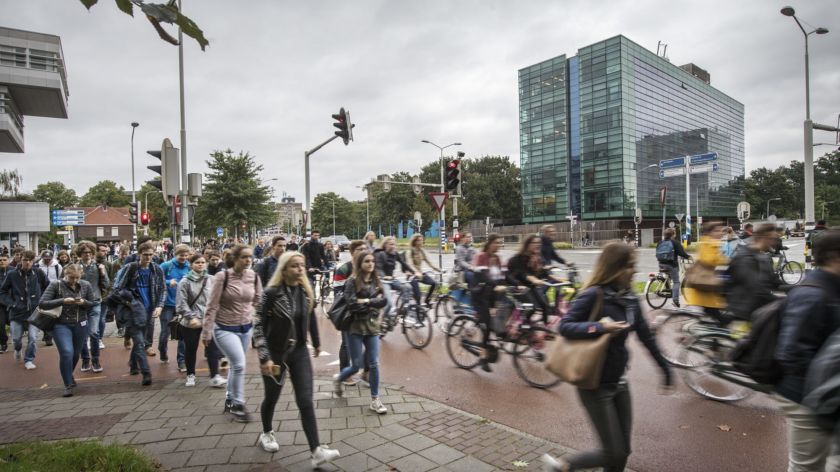Pilot: commuters travelling to campus combine car and public transport
-
 Photo: Bert Beelen
Photo: Bert Beelen
The university is starting a test to offer employees and students a new type of travel advice, in which car travel and public transport are combined. That should result in less pollution and less cars on campus. There will also be more shared cars and bicycles.
The university, hospital, college, and vocational school are starting a pilot that lets students and employees use a mix of transportation methods. So not just travelling by car or train, but both. Or even complemented with a bicycle or bus. All so that as few cars as possible come to campus. Six questions for mobility manager Carlo Buise.
What does the pilot look like?
Say you live in Nuenen in Brabant, and you work at Radboud University. What is the quickest way to get to the office? The car navigation says it should take you about an hour. If you listen to 9292 (public transportation app, ed.), public transportation should take you around two hours. But not a single app combines going by car and train – or even by bike. Whereas, for example, if you hop on the train in Boxmeer, says Carlo Buise, your journey also takes one hour, but with less CO2 emissions.
The mobility employees have, for the region of Nuenen and two other regions, researched how travelers can come to campus with a combination of public and personal transport. ‘People coming from the south often barely move from Malden onwards’, says Buise. ‘For that last part of their journey, they might as well hop on the Maaslijn, already check their emails in the train and then get out at Heyendaal station. That makes for a lot less cars on campus.’
So the goal is less cars on campus?
Yes, says Buise, because the campus of Nijmegen is in the middle of residential neighbourhoods and not designed to handle the traffic. Reducing the number of cars is something that has been worked on for years. Another goal is to reduce CO2 emissions and lighten the pressure on parking around Heyendaal and other neighbourhoods. ‘Don’t forget, a lot of students also travel by car. At the university that number lies around 4 percent, at the college it’s even 10 percent.’
How do you convince students and employees to join the pilot?
‘We look at who lives in the relevant regions and hope to write to them while complying with the current privacy laws’, says Buise. ‘Anyone who participates saves money, because for the duration of the pilot the university will pay for any public transport expenses.’
But what if you’re in Nijmegen and you need a car to go to an appointment?
At the Berchmanianum monastery there are two electric cars to be shared (sign up via [email protected]). And along the Gerard van Swietenlaan, there are more electric bicycles and cars to be shared. ‘We are going to expand the number of shared cars and bicycles next year’, says Buise. ‘There will be different hubs on campus where you can borrow them.’ Buise and his team are currently thinking about an app with which employees can immediately enter expenses for a shared car (or bicycle) in declaration system BASS. That should also make it easier for train tickets.
If those shared cars are already there, can you also take them for personal use in the evening?
Preferably so, says Buise. It should also be possible to reserve the cars after working hours or during the weekend, perhaps even for non-employees who live in Brakkenstein. Of course, they would then have to pay the costs themselves. The university will not be buying the cars itself; that will be done through a tender. A company like Amber (for business shared cars) will then have to ensure that enough cars are available. By 2023, the shared cars and bicycles (including cargo bicycles) must be in place. The municipality is currently working on expanding the shared car fleet with electric scooters, and the university wants to join in.
Can the university forbid staff or students to come to the campus in their own car?
‘Not so much forbidding, but discouraging, for example by charging a higher parking fee if there is a real alternative available. You have to discuss what is realistic.’ As an example, Buise mentions the use of an e-bike for people who live no more than fifteen kilometres from the campus or travelling by train and bus if the travel time does not exceed one hour. ‘Or a combination if your total journey is no longer than one and a half times the car travel time. You can also lower the business mileage allowance for using your own car to encourage people to use a shared car or public transport. These are choices that the Executive Board and the employee representatives have to make.’
Another idea, according to Buise, is to immediately call on potential new employees to come to a job interview by public transport and to provide them with tailor-made travel advice as soon as they enter service. ‘New employees have no ingrained travel behaviour, so you can exert influence there.’



